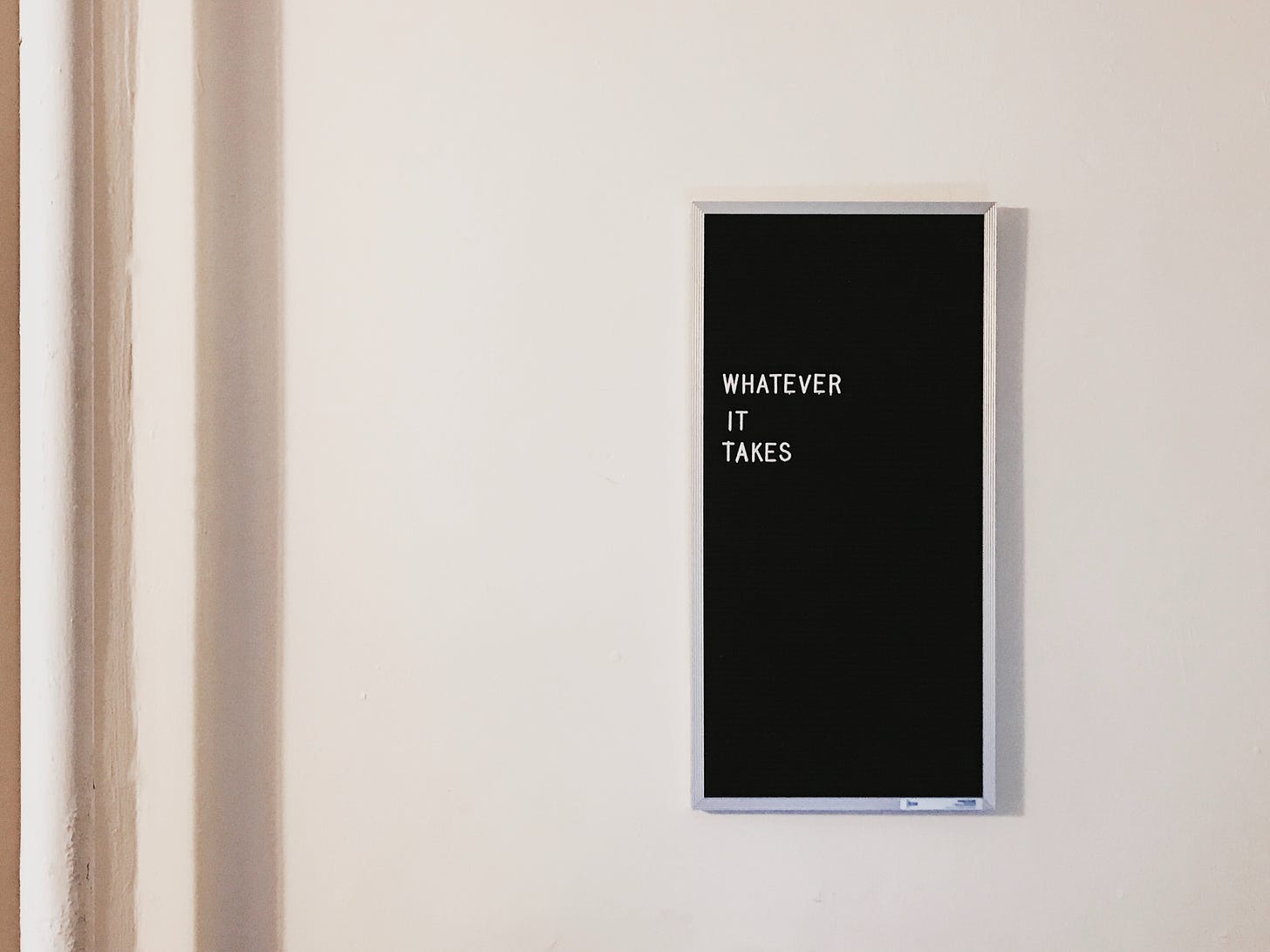You can listen to an audio version of this newsletter above. Please note that this is unedited and I’m recording in my home office. There is some crackling in the audio, an issue I’m trying to sort out. I still hope you find the recording enjoyable and helpful.
Before we dive in, three quick notes:
I’m currently accepting new 1-on-1 coaching clients for biweekly and weekly calls (10% discount for paid Tending subscribers). You can learn more here, read client testimonials here, and schedule a free 30-minute Discovery Call here.
I’m booking workshops with universities and organizations for summer and fall.
In lieu of sending the same email request each month, I’m now accepting questions for my monthly Q&A on a rolling basis. Please ask questions below or email them to me directly to kate@katehenry.com. The next Q&A email will arrive in your inboxes August 30th.

Today’s post is part one of a two-part series on the concept of discipline.
In today’s post, I’m reviewing the ways discipline is discussed by five authors on popular online business and self-development websites. In the second part of the series (coming August 23), I’m going to examine alternatives to “discipline” for people who are interested in developing practices.
Content Warning: Most of the articles I review today refer to weight loss, dieting, or “good” versus “bad” foods in their discussions of discipline.
As a scholar of rhetoric and specifically the way ideas circulate through popular media in order to prime people to think or believe particular things, I couldn’t resist mentioning the discussion of weight loss in the articles I reviewed (mainly because I found it problematic). At the same time, I recognize that while I personally was unsettled by the usage of dieting across the articles, some readers may be interested in discipline as it pertains to weight, health, and physical movement practices. While I offer some critiques today about the use of dieting in discipline literature, I do not intend to shame anyone for their personal goals or practices.
If these topics feel challenging for you to read today, I encourage you to skip ahead to the Curiosities section below.
I was inspired to write this post after attending a workshop and hearing many folks report that they’d be closer to their future ideal work and personal life if only they had more discipline.
My first reaction to seeing the word discipline from so many fellow workshop attendees was one of guardedness. When I think of “discipline,” I tend to think of the obsession with accomplishing something even if it means doing harm to your body or mind.
After the workshop, I polled the people who follow me on Instagram about whether they wish they had more discipline. The results were roughly 65% yes and 35% no. While an Instagram poll is hardly a reliable research methodology, it was interesting to hear folks report that they were craving more of what discipline might offer them.
I became increasingly curious about why so many people said they wanted discipline and also interested in why I feel disciplined in some habits and not in others, so I did a little study.
Some of my favorite Substack newsletters are ones that perform a micro-analysis of a topic through a review of other publications. I decided to do my own small online study on the concept of discipline, starting by Googling “how to have more discipline.”
My goal with this study was to locate texts that people may choose to read when they do an online search about discipline. I chose five popular websites—Fast Company, The Wall Street Journal, Inc., Psychology Today, and LifeHack—for three reasons: the articles were free to access, they seem professional, and they popped up on the first page of my Google results, which means they may be most appealing to folks who are seeking a quick answer.
Here is the article list I compiled for analysis:
Fast Company: “4 Ways to Use Discipline to Be More Productive” (2021) by Amy Stanton
Wall Street Journal: “How to Develop Self-Discipline and Find Motivation” (2021) by Allison Pohle
Psychology Today: “6 Ways to Boost Self-Discipline” (2023) by Dr. Tchiki Davis
LifeHack: “How to Build Self-Discipline to Excel at Life” (2023) by Tracy Kennedy
Inc.:“6 Ways to Develop the Self-Discipline You Need to Reach Your Goals” (2017) by Amy Morin, LCSW
When I started my research project, I wasn’t sure what precisely I’d find, but I was most curious to see if there were patterns in what the writers proposed we practice. I certainly found some interesting things and hope you enjoy this analysis of what I discovered.
What is Discipline?
Discipline was used interchangeably with self-discipline, willpower, self-control, and perseverance in the articles I read. While I’ve used the language of willpower in my work over the years, I’ve been shifting away from using it in discussions of personal resources because telling someone to “harness their willpower” implies that we should be able to will ourselves to complete tasks without acknowledging the nuance of accessibility. I may write more about this in the future, but for now, on to my analysis!
Key Themes in the Articles

Theme 1: One-Size-Fits-All Suggestions
Each online piece suggested tools for developing more discipline or self-discipline. While some of the suggestions seemed quick and easy (lay out your running clothes the night before you want to go on a run), others were more complicated (practice tolerating discomfort). Maybe it’s because I was reading multiple pieces at once, but the list of so many tools felt in some ways overwhelming because there were dozens of approaches to choose from, but in other ways the list of tools might make increasing self-discipline feel more “doable,” as in ”oh, now that I know how to do it, I’ll just do that and it’ll help!”
Tracy Kennedy is LifeHack’s Personal Development Expert. Kennedy’s piece for LifeHack is packed with tools and tips, including increasing motivation, removing temptations, enlisting external accountability, developing habits and rituals, relying on fear or rewards for motivation, and more.
Meanwhile, many of Pohle’s tips are rooted in emotional reframes (motivating yourself with affirmations, pushing past limiting beliefs, giving yourself permission to start even when you’re afraid), while focusing on identifying and breaking down your goals to make them more achievable.
Amy Stanton’s Fast Company piece offers suggestions to increase discipline around non-negotiable practices, which she suggests we develop through routines.
I was reading these for research purposes, not because I was personally interested in learning how to increase my discipline, but I can only imagine how disoriented I may have felt if I were reading them all to actually develop a to-do list of shifts I needed to make to jump-start my discipline.

Theme 2: Discipline is About Optimizing
Some authors suggested that lacking discipline in one part of our life may be indicative that we are lacking it in all parts of our lives, and on the other side of the coin, developing discipline in one part of our life may help to increase it in others. Because I live with two chronic health conditions that affect my energy and I’m connected with chronic illness and disability groups online, I know that not everyone can access or apply the tools that are suggested in these articles. Nor would they want to (remember the 35% of people who responded “no” on my Instagram poll about wanting more discipline).
For example, in “How to Build Self-Discipline to Excel at Life”, Kennedy links self-discipline to “self-control, willpower, and perseverance” and defines it as “the ability to control yourself and make yourself work hard or behave in a particular way without needing anyone else to tell you what to do.” I had a hard time with Kennedy’s framing of self-discipline as a character trait and “sign of commitment to your goals.”
Pohle’s Wall Street Journal piece quotes successful people as evidence of the effectiveness of tools, such as Simone Biles’s use of goal setting to help her thrive as an Olympic gymnast. Biles may use a goal-setting approach, but it is hard to believe that it is the bedrock of her discipline and as a result her success. She has been training in her sport her entire life and is an expert. Her commitment to her goals is sky-high, as is her net worth of $16 million, and her access to training facilities and resources to support her in optimizing her performance. No matter how much I try to optimize achieving my goals, I’ll never have the same experience as Biles—and that’s okay.

Theme 3: So. Much. Diet. Talk.
My hypothesis going into this little research study was that the articles would focus on increasing effectiveness and efficiency with productivity and business, so I was blown away to find so much discussion of weight loss, exercise routines, and “good” vs. “bad” food narratives. I was disconcerted by the articles’ use of diet culture in their examples of things to discipline.
Dr. Tchiki Davis immediately opens “6 Ways to Boost Self-Discipline” with language about food and dieting, a theme that recurs later in her discussion about avoiding temptations. In the piece for LifeHack, Kennedy uses the example of women’s weights being determined by what food and drink they kept on their counter, and I have listened to enough episodes of the podcast Maintenance Phase to have little alarms go off in my critical thinking brain when I hear reports of quick, vast, and sustainable weight loss. Pohle mentions dieting and talks about “bad foods.” And while Stanton stays away from diet language, even she uses her personal exercise routine as an example.
I must admit I was most surprised by the focus on diet culture and losing weight in Amy Morin, LCSW’s article for Inc., a website dedicated to the world of business and entrepreneurship. This weight loss was also targeted towards women—the opening line was “Have you ever heard someone say ‘I wish I had that kind of willpower,’ when her friend orders the salad instead of the fried chicken?” (insert my big eye roll here). Like others, Morin encourages readers to remove temptations that might distract them from their discipline development. That being said, I did like that she encouraged readers to have compassion around making mistakes.
Final Thoughts
As I read through the five articles and dozens of tips and tools suggested in an effort to increase discipline, I saw a few approaches that I teach in terms of deadlines with aversive tasks, goal setting, and habit formation. For example, I encourage people to break their goals down into actionable and achievable task lists and then develop productivity sessions that account for their lived experience with personal resources like time, energy, and focus. I also support the suggestion to tie practices to personal values or future goals as a way to increase motivation to complete aversive tasks.
At the same time, I observed many of the same things I often do when diving into mainstream productivity and hustle culture — harmful ideas rooted in ableism, white supremacy, capitalism, and rugged individualism. Often, these discussions and suggestions around discipline don’t account for our real life and ever-changing circumstances—ultimately rendering them inaccessible and discouraging.
In two weeks, I’ll explore alternatives to developing new habits and practices in other frameworks besides “discipline.”
In the meantime, I’d love to hear your thoughts about today’s post! Please share below in a comment or via an email reply.
Curiosities
This section of my letters is for things that made me say “hmmm” or “wow!” recently.
If you’re a knowledge worker (writer, designer, graphic artist, etc.), do yourself a favor and check out
’s Substack . Palmer shares lists of open jobs in the field of tech and writing and I particularly appreciated her recent post about scams that are targeting creatives.I finished The Founders Trilogy by Robert Jackson Bennett and it was excellent! These fantasy books were long (500+ pages each), so it took me a while to work my way through them, but I came to love the characters and the ending was both devastating and also filled me with joy and satisfaction.
In my exploration of non-alcoholic drinks, I recently found a few that I enjoy! I liked both “Livener” and “Nightcap” by the brand Three Spirit. I also liked De Soi’s “Purple Lune.” I’m always on the hunt for new non-alcoholic drinks to try out, so feel free to share your recommendations!
For Your Consideration
Follow me on Instagram
Order my book, Tend to It: A Holistic Guide to Intentional Productivity
Listen to my podcast interviews
Take care and talk soon,
Dr. Kate















Your findings from those articles are fascinating. Besides being culturally insidious, I wonder if some of the weight loss talk is SEO related (which doesn’t make it excusable!). This post was especially interesting to me as I just made my own first Substack post which in part poses the question “Does anyone have as much discipline as they want?” So to see the question you posed, “Why do we want more discipline?” was a great follow up!
Thank you so much for sharing my newsletter, I am new and really appreciate it!!